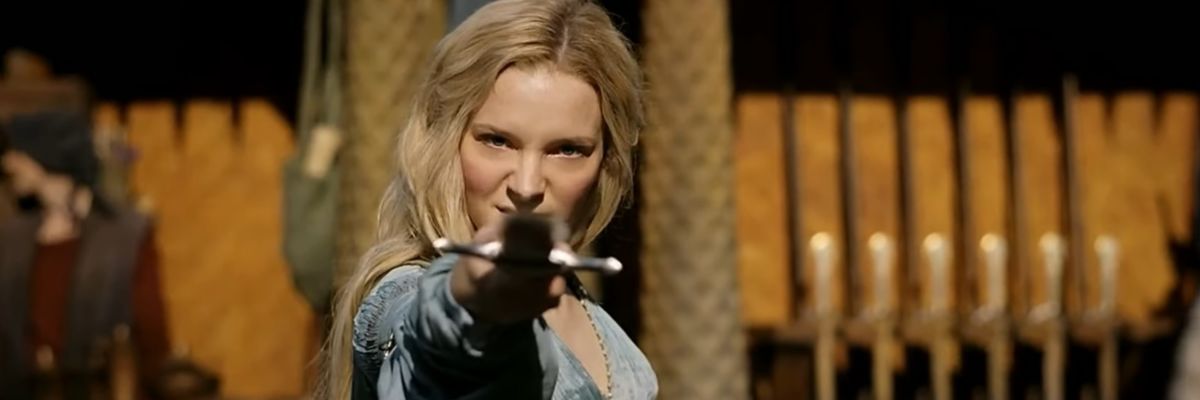
The Rings of Power is the latest adaptation of J.R.R. Tolkien’s epic cosmos, associated with his wildly successful novel The Lord of the Rings. In Amazon’s series, the lavish costumes, magnificent scenery, and fantastical drama hearken to Peter Jackson’s popular movie trilogies, yet the new series offers its own enchantment and cast of characters from the world of Middle Earth.
The elf Galadriel is the heroine—an ethereal character in Jackson’s movies, but here presented in her earlier years as a warrior princess. This type of powerful leading lady is popular in movies today. Combining the positive aspects of today’s heroines with traditional Christian virtues embodied by such as the Virgin Mary and Joan of Arc—Christianity is no stranger to warrior heroines!—creates a relevant femininity appropriate to our times.
In The Rings of Power, Amazon’s Galadriel is a military leader who pursues Sauron, the evil nemesis of Middle Earth. Galadriel is courageous, strong, and persevering, unafraid to confront her enemies. But whereas Galadriel is classically known in Tolkien lore for her wisdom, the new Galadriel seems impetuous and single-minded, lacking diplomacy and careful judgment, all to disastrous effect: she crowns her enemy a king.
How did Amazon get Galadriel so wrong? We can refine three major blunders in this iconic character’s reimagining, all of which speak to the larger moral errors present in The Rings of Power. Not only do these big mistakes hurt the enjoyability of the series, but they also provide bad, even anti-Christian lessons for the show’s viewers.
- Violence is not the answer.
We meet Galadriel as a clever child with an impulsive temper, who punches a boy for wrecking her toy boat. The scene opens the entire series, setting the tone for her pugnacious character. Her combativeness may seem like self-defense, except she escalates the violence. Galadriel’s brother diffuses the situation by asking if she lost her footing. Unfortunately, his excuse early on replaces an opportunity for moral instruction against violence. If peace (or justice) is the objective, then she should respond differently. Her own action is also wrong, or “a sin.”
Galadriel’s brother suggests that evil exists in the world simply because people “focus down,” on the dark, rather than focusing up, toward the light that guides. This oblique instruction is confusing. Galadriel notices that a reflection may be just as bright as the original, so how can she tell if she is following a sham or a real good? Her brother says she must discern the lights for herself, but he offers no objective standard to guide her actions. So the light represents goodness, but what defines the good is never explained. This is so important.
Today, people are invited to speak their own truth. This is dangerous because personal truth may not coincide with God’s truth. When we do objectively bad things, our personal growth and holiness is inhibited. Dostoevsky once observed a woman on trial for murder, who defended her actions because they were in line with her beliefs—yet she admitted in the trial that it is hard to shed blood. The great author emphasized that her admission indicated a deeper moral truth than her philosophy.
Christianity also uses a metaphor of light to represent moral goodness. For Christians, the standard is Christ, the Light of the world: “I am the light of the world. Whoever follows me will not walk in darkness but will have the light of life” (John 8:12). Regarding Galadriel’s situation, for example, the Gospel of Matthew explains that if someone hurts you, the Christlike response is not to become violent, but rather to work it out between you. If necessary, take one or two others along and try again, or tell the Church, and if that does not work, then to treat the person like an outsider (Matt. 18: 15-17). This non-violent framework offers an objective guide for working through difficult confrontations.
- Diplomacy is still relevant.
Diplomacy is the art of managing relationships. Galadriel and the queen of an island called Númenor have an opportunity for diplomatic relations to ally against Sauron. Galadriel is barefoot and dressed in simple linen garments, lacking regalia to indicate her noble status. She must rely on her words alone to convince the queen of her status and mission. But Galadriel is rude and condescending, and the queen puts her in prison. When the queen accuses Galadriel’s friend of committing a crime, she replies, “He is understandably quick to temper: his people are dying.” Like her brother, Galadriel makes excuses for egregious behavior.
In the Greek world of kings and heroes, The Odyssey contains a precedent to Galadriel’s situation. A naked Odysseus is stranded on the island of the Phaeacians, with no fine clothes, no gifts, and no arms to show that he is a person of influence. He must convince the court that he is a king and needs their ships to get home. Odysseus crafts cunning and poetic speeches to indicate his respectable kingly status, and the Phaeacians offer him gifts and enough ships to reach Ithaca. Homer understood the didactic nature of national entertainment.
Diplomacy at the national level is what manners are on a personal level. Manners are a code, a boundary, for people to interact within to protect themselves and others from awkward, immoral, or harmful situations. Ultimately, diplomacy and manners fulfill the Golden Rule, to love God and do to others as you would want done to you. This stems from the fundamental human desire to love and be loved.
Manners and hospitality are essential for Christian living because they establish dignity and respect for everyone. It sounds simple, but Christian leaders have the guidelines for conduct in the Ten Commandments and the subsequent development of Christian doctrine. Manners are outgrowths of this tradition, weaving virtue into the social fabric of nations.
The Harfoots, ancestors of the Hobbits, are the recurring touchstone in The Rings of Power of the fundamental goodness of existence. Nori Harfoot receives advice from her father as she sets off on her adventures: “A Harfoot without manners is as like to get as far in life as a square wheel.” Tolkien insisted that his novels were not Christian allegories, but he drew heavily from Christianity and hoped readers would apply his intended insights to their lives.
- Evil is not necessary.
In Christianity, Mary is the heroine queen, a leader against the forces of evil. God placed “enmity” between her seed and the devil’s seed; her heel perpetually crushes the head of the serpent (Gen. 3:15). Enmity is a state of active opposition, a hostility to someone or something. In Revelation, Mary’s story continues: “And the dragon was wroth with the woman, and went to make war with the remnant of her seed, which keep the commandments of God, and have the testimony of Jesus Christ” (Rev. 12:17). The Theotokos in her hidden home in Nazareth was actively opposing Satan and the forces of evil by raising her child according to God’s will through prayer and keeping God’s commandments.
Galadriel’s brother tells her, “Sometimes one must touch the darkness in order to discern the true light.” Yet, the ultimate Christian heroine is immaculate. Mary’s heroism is prudent, tactful, and virtuous, while vigilant, intelligent, and powerful. At the foot of the cross, Jesus gave us his heroine to be our spiritual mother, and Mary offers us the way to her son in her words to the servant, “Do whatever he tells you” (John 2:5). She is a warrior fighting actively against evil, but her mode is peace. Now she is active in diplomatic missions, as her numerous apparitions around the world indicate.
Almost everyone today watches television. Often, we turn on the TV or put on a movie when we want to relax. Many of us turn off our minds and merely absorb what we see. For many Christians, shows like The Rings of Power are an exciting adaptation of a work by a Christian author for family-friendly entertainment on a major network. But television and other screens are an easy way for wrong or even evil ideas to enter our imaginations and lead us away from God’s truth. Like Galadriel, we mistakenly place idols on thrones.
Even here, we should be vigilant and keep oil in our lamps to see through the darkness. The glow from our screens should not be the overwhelming light! Mary’s channel offers real entertainment, a truly life-giving Meta and physical universe of action, drama, and love in which we are the heroes and true heroines in the stories of our lives.
Image: Morfydd Clark as Galadriel in The Rings of Power. Credit: Legendary Films via YouTube, CC BY 3.0 (cropped).



